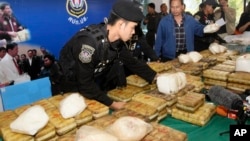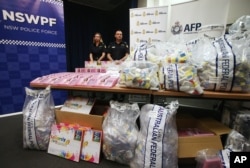The United Nations, alarmed by a rise in amphetamine trafficking across Asia, is calling for Australia to play a larger role in combating the trade.
Officials say a surge in the production of amphetamine-type stimulants (ATS) has been evident in recent years even as trafficking of heroin, produced in the Golden Triangle region of eastern Myanmar, continues to flourish.
In 2015, the United Nations Office on Drugs and Crime (UNODC) reported seizures totaling 27,000 kilograms of highly addictive crystal methamphetamine – known as crystal meth or ‘ice’ – across Cambodia, China, Laos, Myanmar, Thailand and Vietnam.
At the same time seizures of methamphetamine tablets totaled 286 million pills, while heroin produced from poppy cultivation in eastern Myanmar was over 10,000 kilograms. Seizures of chemicals vital to the production of such drugs are also up.
Jeremy Douglas, Asia regional representative for the UNODC, says criminal syndicates are shifting to major production of high purity crystal meth. He said authorities are “seizing large amounts of crystal meth at Australia’s borders – airports, ports, couriers, coming through consignments and big shipments.”
“This is a big, big concern – it’s really flooding the region at the moment. Its highly addictive crystal meth. This is the big concern not just in Australian law enforcement, but New Zealand law enforcement, North American law enforcement are paying close attention to these developments,” Douglas told VOA.
Australia and New Zealand are key targets of the syndicates due to the countries’ high incomes and drug usage rates.
Since late 2015 Australia’s Federal Police (AFP) have signed agreements with China and Thailand to boost cooperation against the trafficking of drugs into Australia.
The agreement with China linked the AFP with the Chinese National Narcotics Control Commission (NNCC), China’s anti-smuggling bureau (ASB) and the Guangdong Public Security Bureau (GPSB).
A similar task force agreement with Thailand’s anti-money laundering authority and narcotics control agencies is code-named Task Force Storm.
AFP chief commissioner Andrew Colvin said the task force agreements are “very significant.”
“What we’re seeing increasingly are threats emanating from various countries that impact on Australia. So it’s in our interests to work regionally to help secure the region but also that has incredible domestic impact as well."
Colvin said the new task force with Thailand "will be very focused on human trafficking, money laundering, counter-narcotics in particular.”
Thai narcotics officials and the UNODC say Australia's operational experience in combating drug smuggling can benefit its neighbors in the Association of South East Asian Nations. Officials point out that increased trade and looserborder restrictions under the ASEAN Economic Community create opportunities for organized crime to move drugs and precursor chemicals more easily across borders.
“Australia should come and associate more with ASEAN as a bloc," said Rachanikorn Sarasin, a former ONCB deputy director and now an international adviser. "Australia is a good friend of ASEAN member states, so Australia can help ASEAN in this part. You have the capacity and technology – you can help or give advice or exchange experiences with ASEAN.”
Rachanikorn said a China-initiated program for the Mekong region has already fostered growing cooperation within among Cambodia, China, Laos, Myanmar, Thailand and Vietnam.
UNODC’s Douglas agrees Australian law enforcement could play a larger role in supporting the region’s efforts to combat drug trafficking. He said U.N. support can help overcome any political obstacles that may arise.
“The agreement that Thailand and Australia ventured into is really great. We encourage that kind of agreement. But it really needs to involve many, many countries at one time,” he said.





